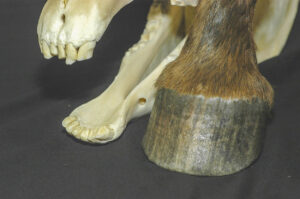Researchers Reverse Temporary Immunocastration
- Topics: Article, Castration & Gelding, Horse Care, Stallion Care
Stallions that do not fully recover breeding capacity after temporary castration via a vaccine that works against reproductive hormone GnRH can now be assisted through daily injections of buserelin, a GnRH agonist, said European researchers.
Equity, an anti-GnRH vaccine from Pfizer Animal Health currently marketed in Australia to control heat cycles in mares, can also be administered to stallions to temporarily “immunocastrate” them. The drug inhibits testosterone and can be used to improved behavior during competition season, for example. While most stallions receiving the Equity vaccine recover their full breeding capacity within a year, there is a risk that these horses could remain permanently castrated, said Marianne Vidament, DVM, researcher at the French National Stud and the French National Institute for Agricultural Research (INRA), and primary author of the study.
But now there’s hope to reverse that process, at least temporarily, Vidament said. Intramuscular injections of buserelin every morning, starting two months before breeding season and continuing throughout the season, appear to restore both libido and fertility to pre-castration levels, she said.
In her study, Vidament focused on stallions which had been immunocastrated because they carried the equine viral arteritis virus. Within eight months, seven of the eight stallions no longer shed the virus, she said. However, three of the stallions experienced long-term castration, unable to breed the following season
Create a free account with TheHorse.com to view this content.
TheHorse.com is home to thousands of free articles about horse health care. In order to access some of our exclusive free content, you must be signed into TheHorse.com.
Start your free account today!
Already have an account?
and continue reading.

Related Articles
Stay on top of the most recent Horse Health news with

















